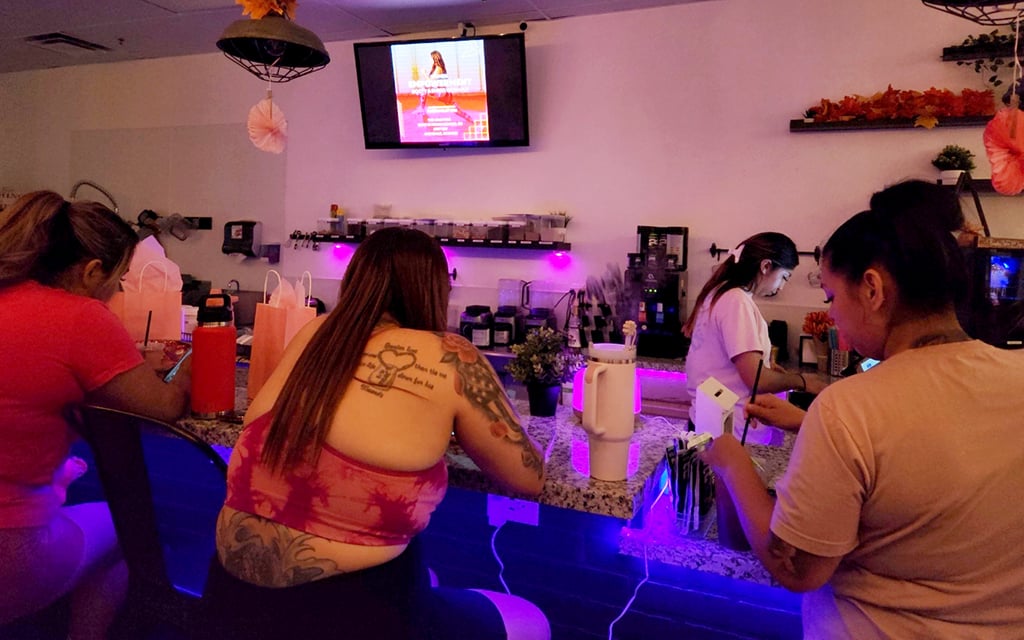Women pose for a photo during a workout at The Daily Mix Nutrition Store in Avondale on September 24, 2024. (Photo by Nicollette Valenzuela/Cronkite News)
Listen to this story.
PHOENIX – “Can we go straight to the empowerment session?” someone calls out from the crowd outside a small, dimly lit store with a fluorescent pink glow. The “Empowerment Session” brings together more than 30 participants every Tuesday evening at The Daily Mix Nutrition Store in Avondale.
After a battle with postpartum depression, Yormheri Munguia, the shop owner, and Jennie Parra, a women’s transformation trainer, recently started the Women’s Empowerment workout.
“I was diagnosed with postnatal depression. … They immediately offer medicine like this, take this medicine and you will feel better,” Parra said.
Parra added that while medication can be a quick fix for depression, it eventually wears off and doesn’t have a lasting effect. “I really feel like if you feed your body right, if you take care of it, if you move your body, it’s supposed to heal,” Parra said.
While the World Health Organization defines maternal mortality as deaths that occur during pregnancy, childbirth, or within 42 days of abortion, the Arizona Department of Health Services (ADHS) Maternal Mortality Review Committee (MMRC) tracks and reports all deaths during pregnancy or within the first year after the end of a pregnancy.
“I remember not taking care of myself and… falling into postpartum depression, the baby blues. Very mild, but… after we established a good diet, I decided to join the Herbalife community and felt empowered,” Munguia said.
Munguia said she lost weight and gained clarity and understanding, which ultimately helped her change her mindset. “If we do well, our family will do well,” Munguia said.
According to Centers for Disease Control and Prevention (CDC) data from 2018 to 2022, the United States leads the developed world in maternal mortality, with Arizona ranking 11th in the United States.

Women at the Daily Mix Nutrition Store in Avondale prepare for their Women Empowerment Workout Program September 24th. (Photo by Nicollette Valenzuela/Cronkite News)
“In Arizona, the last two reports have cited maternal mental health as a leading cause of maternal deaths, so this is a consistent trend,” said Elizabeth Wood, a member of the MMRC. The second highest contributor is substance abuse disorders, and the ADHD report says most of these deaths are preventable.
This year, the CDC increased the grant size from $450,000 to $570,000 per year with a five-year commitment to reduce pregnancy-related deaths. The funds will help ADHS connect with affected families, expedite case detection and verification processes, and share prevention resources.
“This program funds the Maternal Mortality Review Committee and … one of our goals is to maintain and improve the diversity of Maternal Mortality Review members,” said Mary Glidden, director of the Fatality Review Office at ADHS.
Pregnancy and childbirth survival rates vary by race and ethnicity in the United States, and Arizona is no different. The state’s hardest-hit population is American Indians and Alaska Natives, with a reported 233.9 deaths per 100,000 live births. This ratio is 166.8 for black women, 80.1 for white women, and 72 for the Hispanic population.
“Nationwide, Black and Native American women experience disproportionately higher maternal mortality rates, and this disparity is certainly reflected in Arizona. “So ensuring a diverse committee … helps broaden our discussions and develop informed recommendations aimed at meaningfully engaging communities in these prevention efforts,” Glidden said.
Most pregnancy-related deaths occur in rural parts of the state’s northern, western and eastern regions, where many of the state’s 22 federally recognized tribes live. According to the ADHS report, a total of 228.9 deaths per 100,000 live births were reported in the regions mentioned. These parts of the state do not have access to maternity services.

Women at The Daily Mix Nutrition Store in Avondale prepare for their women’s empowerment workout program September 24th. (Photo by Nicollette Valenzuela/Cronkite News)
“Many hospitals are closing because they feel like they can’t employ all the gynecologists and because they can’t afford professional liability insurance. So they close and then strand some mothers an hour and a half from the hospital where they might give birth,” said Steve Calvin, associate professor of obstetrics and gynecology in the division of maternal-fetal medicine at Banner University Medical Center in Phoenix.
In total, ADHS reported 43 cases of maternal deaths in 2018-2019, increasing the maternal mortality rate by almost half compared to the previous two years.
In addition to limited funding for rural hospitals, the state lacks the resources to conduct comprehensive research on maternal mental health. “We don’t have a single perinatal mental health study specific to Arizona,” Wood said. Mental health care providers do not reflect those they serve, Wood said, contributing to misconceptions. “Expanding our offering to be more reflective of the populations they serve would reduce stigma while improving outcomes because people would feel like they are being heard and understanding of the culture they come from , and the people they are.”
Back at the Daily Mix Nutrition shop, women are celebrating a 21-day challenge completed by two participants: one lost 12 pounds, the other 10, with both saying they felt “amazing” and “loving” it felt. “This community is for you,” said Parra, the workshop coach, as applause and cheers erupted.
Parra said no one has to go through this journey alone. “I just feel like it’s not talked about enough. I feel like a lot of people struggle with their mental health and are either afraid to talk about it or feel like they have to go through it alone. And by creating space, I want women to feel like I’m there for you, for whatever you need, and vice versa.”






